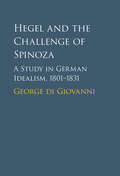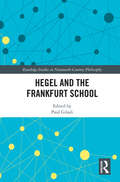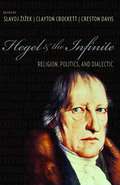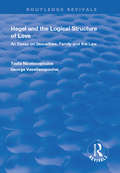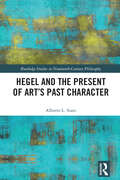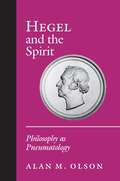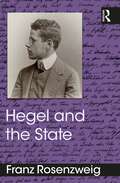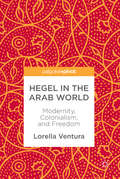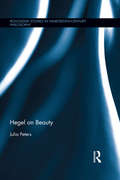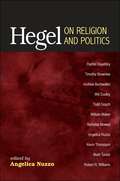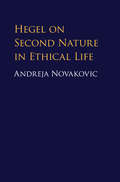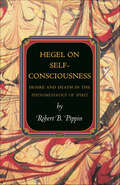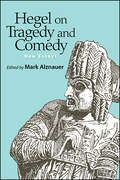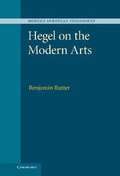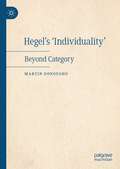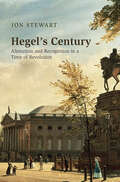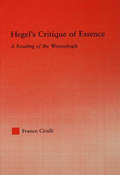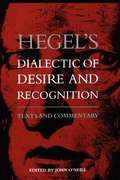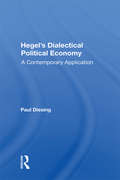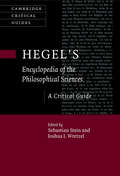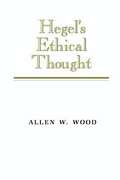- Table View
- List View
Hegel and the Challenge of Spinoza: A Study in German Idealism, 1801–1831
by George di GiovanniHegel and the Challenge of Spinoza explores the powerful continuing influence of Spinoza's metaphysical thinking in late eighteenth- and early nineteenth-century German philosophy. George di Giovanni examines the ways in which Hegel's own metaphysics sought to meet the challenges posed by Spinoza's monism, not by disproving monism, but by rendering it moot. In this, di Giovanni argues, Hegel was much closer in spirit to Kant and Fichte than to Schelling. This book will be of interest to students and researchers interested in post-Kantian Idealism, Romanticism, and metaphysics.
Hegel and the Frankfurt School (Routledge Studies in Nineteenth-Century Philosophy)
by Paul GiladiThis collection of original essays discusses the relationship between Hegel and the Frankfurt School Critical Theory tradition. The book’s aim is to take stock of this fascinating, complex, and complicated relationship. The volume is divided into five parts: Part I focuses on dialectics and antagonisms. Part II is concerned with ethical life and intersubjectivity. Part III is devoted to the logico-metaphysical discourse surrounding emancipation. Part IV analyses social freedom in relation to emancipation. Part V discusses classical and contemporary political philosophy in relation to Hegel and the Frankfurt School, as well as radical-democratic models and the outline and functions of economic institutions.
Hegel and the Frankfurt School: Traditions in Dialogue (Routledge Studies in Nineteenth-Century Philosophy)
by Paul GiladiThis collection of original essays discusses the relationship between Hegel and the Frankfurt School Critical Theory tradition. The book’s aim is to take stock of this fascinating, complex, and complicated relationship. The volume is divided into five parts: Part I focuses on dialectics and antagonisms. Part II is concerned with ethical life and intersubjectivity. Part III is devoted to the logico-metaphysical discourse surrounding emancipation. Part IV analyses social freedom in relation to emancipation. Part V discusses classical and contemporary political philosophy in relation to Hegel and the Frankfurt School, as well as radical-democratic models and the outline and functions of economic institutions.
Hegel and the Infinite: Religion, Politics, and Dialectic (Insurrections: Critical Studies in Religion, Politics, and Culture)
by Creston Davis Slavoj Clayton Crockett Eds. iekCatherine Malabou, Antonio Negri, John D. Caputo, Bruno Bosteels, Mark C. Taylor, and Slavoj Zizek join seven others—including William Desmond, Katrin Pahl, Adrian Johnston, Edith Wyschogrod, and Thomas A. Lewis—to apply Hegel's thought to twenty-first-century philosophy, politics, and religion. Doing away with claims that the evolution of thought and history is at an end, these thinkers safeguard Hegel's innovations against irrelevance and, importantly, reset the distinction of secular and sacred.These original contributions focus on Hegelian analysis and the transformative value of the philosopher's thought in relation to our current "turn to religion." Malabou develops Hegel's motif of confession in relation to forgiveness; Negri writes of Hegel's philosophy of right; Caputo reaffirms the radical theology made possible by Hegel; and Bosteels critiques fashionable readings of the philosopher and argues against the reducibility of his dialectic. Taylor reclaims Hegel's absolute as a process of infinite restlessness, and Zizek revisits the religious implications of Hegel's concept of letting go. Mirroring the philosopher's own trajectory, these essays progress dialectically through politics, theology, art, literature, philosophy, and science, traversing cutting-edge theoretical discourse and illuminating the ways in which Hegel inhabits them.
Hegel and the Logical Structure of Love: An Essay on Sexualities, Family and the Law (Routledge Revivals)
by Toula Nicolacopoulos George VassilacopoulosFirst published in 1999, this is an interesting and significantly valuable example of how Hegel’s Logic can be applied to his own interpretation of his time to produce a contemporary Hegelian view of our world and its problems. The authors show that by the logic of the family, as conceived by Hegal, contemporary views about same sec and single parent families can be justified and defunded. The male-dominance and heterosexual orientation taken for granted by Hegal’s own world is not mandated by the Logic. I find their argument completely convincing. They demonstrate beyond dispute that Hegel’s speculative philosophy remains relevant for us, a very fruitful in its applications.
Hegel and the Metaphysics of Absolute Negativity
by Brady BowmanHegel's doctrines of absolute negativity and 'the Concept' are among his most original contributions to philosophy and they constitute the systematic core of dialectical thought. Brady Bowman explores the interrelations between these doctrines, their implications for Hegel's critical understanding of classical logic and ontology, natural science and mathematics as forms of 'finite cognition', and their role in developing a positive, 'speculative' account of consciousness and its place in nature. As a means to this end, Bowman also re-examines Hegel's relations to Kant and pre-Kantian rationalism, and to key post-Kantian figures such as Jacobi, Fichte and Schelling. His book draws from the breadth of Hegel's writings to affirm a robustly metaphysical reading of the Hegelian project, and will be of great interest to students of Hegel and of German Idealism more generally.
Hegel and the Present of Art’s Past Character (Routledge Studies in Nineteenth-Century Philosophy)
by Alberto L. SianiThis book reclaims Hegel’s notion of the “end of art”—or, more precisely, of “art’s past character”—not just as a piece of the history of philosophy but as a living critical and interpretive methodology. It addresses the presence of the past character of art both in Hegel and contemporary philosophy and aesthetics. The book’s innovative contribution lies in unifying the Hegelian thesis with discussions of contemporary art and philosophy. The author not only offers a Hegelian exegesis but applies the idea of the past character of art to themes that are both related to Hegel’s philosophy, such as the French Revolution and the modern state, Kantian aesthetics, and religion and the sacred space disclosed for art, and going beyond Hegel, such as Celan's poetry, Gramsci's criticism of Croce, human rights, and even the grunge rock band Pearl Jam. Conversely, such non-Hegelian explorations will help enlighten what may look like a specific thread of Hegel’s aesthetics, but can be used to shed light on some core motives of his philosophy. The author’s interpretation of art’s past character reclaims the full value, attractiveness, and philosophical soundness of Hegel’s thesis, while rejecting its interpretation in terms of a complete dissolution of the aesthetic element into the philosophical one. Hegel and the Present of Art’s Past Character will be of interest to scholars and advanced students working on Hegel, philosophy of art and aesthetics, history of philosophy, political philosophy, and art theory.
Hegel and the Present of Art’s Past Character (Routledge Studies in Nineteenth-Century Philosophy)
by Alberto L. SianiThis book reclaims Hegel’s notion of the “end of art”—or, more precisely, of “art’s past character”—not just as a piece of the history of philosophy but as a living critical and interpretive methodology. It addresses the presence of the past character of art in both Hegel and contemporary philosophy and aesthetics. The book’s innovative contribution lies in unifying the Hegelian thesis with discussions of contemporary art and philosophy. The author not only offers a Hegelian exegesis but also applies the idea of the past character of art to themes that are related to both Hegel’s philosophy, such as the French Revolution and the modern state, Kantian aesthetics, and religion and the sacred space disclosed for art, and going beyond Hegel, such as Celan's poetry, Gramsci's criticism of Croce, human rights, and even the grunge rock band Pearl Jam. Conversely, such non-Hegelian explorations will help enlighten what may look like a specific thread of Hegel’s aesthetics, but can be used to shed light on some core motives of his philosophy. The author’s interpretation of art’s past character reclaims the full value, attractiveness, and philosophical soundness of Hegel’s thesis, while rejecting its interpretation in terms of a complete dissolution of the aesthetic element into the philosophical one. Hegel and the Present of Art’s Past Character will be of interest to scholars and advanced students working on Hegel, philosophy of art and aesthetics, history of philosophy, political philosophy, and art theory.
Hegel and the Spirit: Philosophy as Pneumatology
by Alan M. OlsonHegel and the Spirit explores the meaning of Hegel's grand philosophical category, the category of Geist, by way of what Alan Olson terms a pneumatological thesis. Hegel's philosophy of spirit, according to Olson, is a speculative pneumatology that completes what Adolf von Harnack once called the "orphan doctrine" in Christian theology--the doctrine of the Holy Spirit. Olson argues that Hegel's development of philosophy as pneumatology originates out of a deep appreciation of Luther's dialectical understanding of Spirit and that Hegel's doctrine of Spirit is thus deeply interfused with the values of Würtemberg Pietism. Olson further maintains that Hegel's Enzyklopdie is the post-Enlightenment philosophical equivalent of a Trinitätslehre and that his Rechtsphilosophie is an ecclesiology. Thus Hegel and the Spirit demonstrates the truth of Karl Barth's observation that Hegel is the potential Aquinas of Protestantism. Exploring Hegel's philosophy of spirit in historical, cultural, and personal religious context, the book identifies Hegel's relationship with Hölderlin and his response to Hölderlin's madness as key elements in the philosopher's religious and philosophical development, especially with respect to the meaning of transcendence and dialectic.
Hegel and the State
by Franz RosenzweigFranz Rosenzweig (1886–1929) is one of the most significant German Jewish philosophers of the twentieth century. Published in German in 1920 and now finally available in English for the first time, Hegel and the State is a major contribution to the understanding of Hegel's political and social thought and a profound analysis of the intellectual currents that shaped the German state in the late nineteenth and early twentieth centuries. Through careful readings of Hegel’s early handwritten manuscripts, Rosenzweig shows that Hegel was wrestling with the problem of how to reconcile the subjectivity and freedom of the individual within a community and ultimately the political state. According to Rosenzweig, the route out of this conundrum chosen by Hegel shaped his mature political philosophy, where he saw the relationship between the individual and the state as reciprocal. At a deeper level, the significance of Hegel and the State lies in the way that Rosenzweig explains the failure of Hegel's quasi-communitarian view of the state to emerge, due to the authoritarian direction of the newly unified German state under Bismarck. Anticipating the political and moral disaster that was to follow, Rosenzweig concludes by questioning the very viability of any theory of the state that relies on the pillars of bureaucratic militarism and a government-supported capitalist business culture. With the inclusion of a Foreword by Myriam Bienenstock and a substantial Afterword by Axel Honneth, Hegel and the State is a ground-breaking work of early twentieth-century philosophical and political thought. It is essential reading for students of Hegel, German Idealism, Jewish philosophy, and the origins of critical theory. It will also be of interest to those in related subjects such as the history of sociology, and German and intellectual history.
Hegel in the Arab World: Modernity, Colonialism, And Freedom
by Lorella VenturaHegel's philosophy has been of fundamental importance for the development of contemporary thought and for the very representation of Western modernity. This book investigates Hegel’s influence in the Arab world, generally considered "other" and far from the West, focusing specifically on Syria, Lebanon, and Egypt. Lorella Ventura discusses the reception of Hegelian thought and outlines a conceptual grid to help interpret the historical, cultural, and political events that have affected the Arab region in the last two centuries, and shed light on some aspects of its complex relationship with the western world.
Hegel on Beauty (Routledge Studies in Nineteenth-Century Philosophy)
by Julia PetersWhile the current philosophical debate surrounding Hegel’s aesthetics focuses heavily on the philosopher’s controversial ‘end of art’ thesis, its participants rarely give attention to Hegel’s ideas on the nature of beauty and its relation to art. This study seeks to remedy this oversight by placing Hegel’s views on beauty front and center. Peters asks us to rethink the common assumption that Hegelian beauty is exclusive to art and argues that for Hegel beauty, like art, is subject to historical development. Her careful analysis of Hegel’s notion of beauty not only has crucial implications for our understanding of the ‘end of art’ and Hegel’s aesthetics in general, but also sheds light on other fields of Hegel’s philosophy, in particular his anthropology and aspects of his ethical thought.
Hegel on Philosophy in History
by Rachel Zuckert James KreinesIn this volume honouring Robert Pippin, prominent philosophers such as John McDowell, Slavoj Žižek, Jonathan Lear, and Axel Honneth explore Hegel's proposals concerning the historical character of philosophy. Hegelian doctrines discussed include the purported end of art, Hegel's view of human history, including the history of philosophy as the history of freedom (or autonomy), and the nature of self-consciousness as realized in narrative or in action. Hegel scholars Rolf-Peter Horstmann, Sally Sedgwick, Terry Pinkard, and Paul Redding attempt to vindicate some of Hegel's claims concerning historical philosophical progress, while others such as Robert Stern, Christoph Menke, and Jay Bernstein suggest that Hegel either did not conceive of philosophy as progressing unidirectionally or did not make good on his claims to progress: perhaps we should still be Aristotelians in ethics, or perhaps we are still torn between sensibility and reason, or between individuality and social norms. Perhaps capitalism has exacerbated such problems.
Hegel on Religion and Politics
by Angelica NuzzoAlthough scholars have written extensively on Hegel's treatment of religion and politics separately, much less has been written about the connections between the two in his thought. Religion in Hegel's philosophy occupies a difficult position relative to politics, existing both within the ethical and historical reality of the state and at the same time maintaining an absolute, transcendent identity. In addition, Hegel's views on the relationship between the two were often revised and refined over time in both his written works and his lectures. His thinking on the subject, however, provides a fascinating look at an element of his practical philosophy that was as controversial in his time as it is in ours. This book highlights various approaches to this intersection in Hegel's thought and evaluates its relevance to contemporary problems, considering issues such as religious pluralism and tolerance, conflicts between Islam and Christianity, and tensions between the secular and religious state.
Hegel on Second Nature in Ethical Life
by Andreja NovakovicWhat does it take to be subjectively free in an objectively rational social order? In this book Andreja Novakovic offers a fresh interpretation of Hegel's account of ethical life by focusing on his concept of habit or 'second nature'. Novakovic addresses two central and difficult issues facing any interpretation of his Philosophy of Right: why Hegel thinks that it is is better to relate unreflectively to the laws of ethical life, and which forms of reflection, especially critical reflection, remain available within ethical life. Her interpretation draws on numerous parts of Hegel's system, particularly on his 'Anthropology' and his Phenomenology of Spirit, and also explores connections between his account and those of other philosophers. Her aim is to argue that Hegel has a compelling conception of the ordinary ethical standpoint which takes seriously both the virtues and the perils of reflection.
Hegel on Self-Consciousness: Desire and Death in the Phenomenology of Spirit (Princeton Monographs in Philosophy #35)
by Robert B. PippinIn the most influential chapter of his most important philosophical work, the Phenomenology of Spirit, Hegel makes the central and disarming assertions that "self-consciousness is desire itself" and that it attains its "satisfaction" only in another self-consciousness. Hegel on Self-Consciousness presents a groundbreaking new interpretation of these revolutionary claims, tracing their roots to Kant's philosophy and demonstrating their continued relevance for contemporary thought. As Robert Pippin shows, Hegel argues that we must understand Kant's account of the self-conscious nature of consciousness as a claim in practical philosophy, and that therefore we need radically different views of human sentience, the conditions of our knowledge of the world, and the social nature of subjectivity and normativity. Pippin explains why this chapter of Hegel's Phenomenology should be seen as the basis of much later continental philosophy and the Marxist, neo-Marxist, and critical-theory traditions. He also contrasts his own interpretation of Hegel's assertions with influential interpretations of the chapter put forward by philosophers John McDowell and Robert Brandom.
Hegel on Tragedy and Comedy: New Essays
by Mark AlznauerNo philosopher has treated the subject of tragedy and comedy in as original and searching a manner as G. W. F. Hegel. His concern with these genres runs throughout both his early and late works and extends from aesthetic issues to questions in the history of society and religion. Hegel on Tragedy and Comedy is the first book to explore the full extent of Hegel's interest in tragedy and comedy. The contributors analyze his treatment of both ancient and modern drama, including major essays on Sophocles, Aristophanes, Shakespeare, Goethe, and the German comedic tradition, and examine the relation of these genres to political, religious, and philosophical issues. In addition, the volume includes several essays on the role tragedy and comedy play in Hegel's philosophy of history. This book will not only be valuable to those who wish for a general overview of Hegel's treatment of tragedy and comedy but also to those who want to understand how his treatment of these genres is connected to the rest of his thought.
Hegel on the Modern Arts
by Benjamin RutterDebates over the 'end of art' have tended to obscure Hegel's work on the arts themselves. Benjamin Rutter opens this study with a defence of art's indispensability to Hegel's conception of modernity; he then seeks to reorient discussion toward the distinctive values of painting, poetry, and the novel. Working carefully through Hegel's four lecture series on aesthetics, he identifies the expressive possibilities particular to each medium. Thus, Dutch genre scenes animate the everyday with an appearance of vitality; metaphor frees language from prose; and Goethe's lyrics revive the banal routines of love with imagination and wit. Rutter's important study reconstructs Hegel's view not only of modern art but of modern life and will appeal to philosophers, literary theorists, and art historians alike.
Hegel's 'Individuality': Beyond Category
by Martin DonoughoThis book explores an overlooked area in Hegel studies: his use of ‘individuality’ (Individualität). Hegel joined a lively conversation, from Leibniz to Romanticism and beyond, about this novel concept/phenomenon. Successive chapters track Hegel’s engagement, in such texts as the Phenomenology, Encyclopedia, and Aesthetics. Hegel’s system tends to follow a syllogistic logic (universal, particular, singular), but ‘individuality’ departs from the norm. The category enacts a certain pragmatics (as against semantics or syntactics) regarding tacit assumptions at work or implicit terms of address, which requires active participation by a thinking subject charged with discerning individuality (which bars resort to explicit rules). The category reflexively implicates the user even in presuming an objective context.‘Individuality’ should not be confused with ‘individualism,’ wholly distinct in origin. Moreover, Hegel’s Aesthetics embraces a paradoxical anachronism. Like ‘art’ itself, ‘individuality’ emerged as an essentially modern category, though one transferred to the past and to distant cultures.
Hegel's Century: Alienation and Recognition in a Time of Revolution
by Jon StewartThe remarkable lectures that Hegel gave in Berlin in the 1820s generated an exciting intellectual atmosphere which lasted for decades. From the 1830s, many students flocked to Berlin to study with people who had studied with Hegel, and both his original students, such as Feuerbach and Bauer, and later arrivals including Kierkegaard, Engels, Bakunin, and Marx, evolved into leading nineteenth-century thinkers. Jon Stewart's panoramic study of Hegel's deep influence upon the nineteenth century in turn reveals what that century contributed to the wider history of philosophy. It shows how Hegel's notions of 'alienation' and 'recognition' became the central motifs for the era's thinking; how these concepts spilled over into other fields – like religion, politics, literature, and drama; and how they created a cultural phenomenon so rich and pervasive that it can truly be called 'Hegel's century.' This book is required reading for historians of ideas as well as of philosophy.
Hegel's Critique of Essence: A Reading of the Wesenlogic
by Franco CirulliThis volume shows how The Doctrine of Essence intersects with perennial philosophical questions including above all, the relationship between freedom and determinism. The Doctrine of Essence is of central importance, since it is a critical description of traditional categories which also functions as the justification of Hegel's speculative understanding of essence. This study takes an historical approach to build upon Hegel's abstract argument, viewing it as a confrontation with his predecessors, inparticular - Fichte and Schelling.
Hegel's Dialectic Of Desire And Recognition: Texts and Commentary (SUNY Series in the Philosophy of the Social Sciences)
by John O'NeillThis book presents three generations of German, French, and Anglo-American thinking on the Hegelian narrative of desire, recognition, and alienation in life, labor, and language—a narrative that has been subject to extensive commentary in philosophy, literature, psychoanalysis, and feminist thought. The texts focus on a central topos in Western thought, the story of self-consciousness awakened in nature and in history. John O’Neill argues that current postmodern rejections of the Hegelian-Marxist narrative demand an understanding of the texts included here. Without Hegel and Marx in our toolbox, he argues, we will flounder in a world marked by the split between postmodern indifference and premodern passion. <p><p> The book makes a strong selection from the history of Hegelian-Marxist debate, hermeneutical and critical theory, and Freudian/Lacanian and feminist commentary on the dialectic of desire and recognition, on the levels of social psychology and political economy. Included are articles by Karl Marx, G. W. F. Hegel, Alexandre Kojève, Jean Hyppolite, Jean-Paul Sarte, Georg Lukács, Jürgen Habermas, Hans-Georg Gadamer, Howard Adelman, Shlomo Avineri, Jessica Benjamin, Edward S. Casey and J. Melvin Woody, Henry S. Harris, George Armstrong Kelly, Ludwig Siep, Judith N. Shklar, and Henry Sussman. The texts and commentaries show how the Hegelian-Maxist narrative of desire, recognition, and alienation is a contested story, one in which class, race, and gender issues are drawn into a historical romance that is being rewritten in contemporary cultural politics.
Hegel's Dialectical Political Economy: A Contemporary Application
by Paul DiesingThis book demonstrates how Hegel's dialectic can be used in empirical research, and shows how one can do dialectical research in economics. It also shows how one can use dialectical thinking to interpret some personal or social or political problem and devise a possible solution.
Hegel's Encyclopedia of the Philosophical Sciences: A Critical Guide (Cambridge Critical Guides)
by Sebastian Stein Joshua I. WretzelHegel regarded his Enyclopedia of the Philosophical Sciences as the work which most fully presented the scope of his philosophical system and its method. It is somewhat surprising, therefore, that scholars regularly accord it only a secondary status. This Critical Guide seeks to change that, with sixteen newly-written essays from an international group of leading Hegel scholars that shed much-needed light on both the whole and the parts of the Encyclopedia system. Topics include the structure and aim of the Encyclopedia system as a whole, the differences between the greater and lesser Logics, the role of nature in Hegel's thinking, and the shapes of absolute spirit as art, religion, and philosophy. This book will be invaluable to students and scholars with an interest in Hegel and the history of philosophy.
Hegel's Ethical Thought
by Allen W. WoodThis important new study offers a powerful exposition of the ethical theory underlying Hegel's philosophy of society, politics, and history. Professor Woodshows how Hegel applies his theory to such topics as human rights, the justification of legal punishment, criteria of moral responsibility, and the authority of individual conscience. The book includes a critical discussion of Hegel's treatment of other moral philosophers (especially Kant, Fichte and Fries), provides an account of the controversial concept of 'ethical life', and shows the relation between the theory and Hegel's critical assessment of modern social institutions. The book is nontechnical and should interest anyone concerned with Hegel's ethical and political thought, including philosophers, political scientists, intellectual historians and students of German culture.
